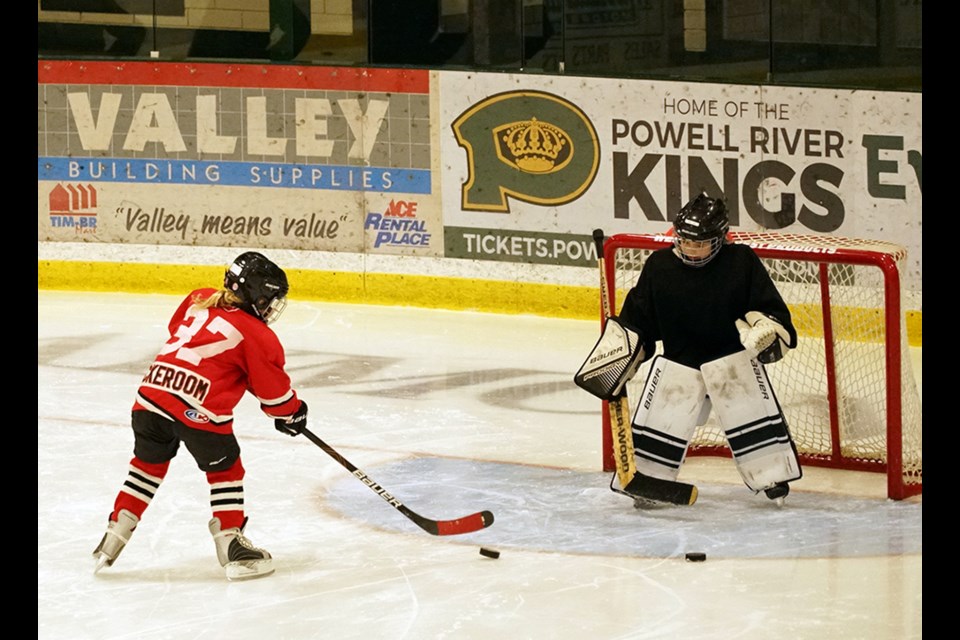Female hockey is thriving in the qathet region.
Julie Venselaar, female coordinator with the Powell River Minor Hockey Association board, and a coach, said the female development program was started about 15 years ago.
“There were girls playing hockey with the boys, but it was like, okay, let’s have an ice time where the girls can be all together, and this will be in addition to what they are doing with the boys,” said Venselaar. “They could have a chance to play with other girls and be coached with girls, have some female development time, and boost their skills.
“It was growing and we realized there were a bunch of girls who wanted to come out and play hockey but didn’t necessarily want to play with the boys. Over the past few years, it morphed into a space for girls to come out and give hockey a try.”
Venselaar said the program also allowed players to join later in terms of age. She said it’s hard to join boys hockey at 12 years of age, but there is provision in the female program to do so.
“Then, we realized there was this core of girls who wanted to do more – compete and play games,” said Venselaar. “So, in 2020, it was the first year we rostered a girls team. Unfortunately, it was during COVID-19 and there were no games.
“We have had a girls team since then, and this year, we now have two girls teams. We have an under-11 team and an under-15 team. We also still have our development program.”
Venselaar said in the past six years, the female hockey program has gone from having one one-hour-long ice time to four ice times a week that are female only, which is “a big growth.” She said in addition to this, there are also some girls coming out of the development program who want to play high-end competitive hockey.
Several players have tried out and made female rep teams on Vancouver Island. There are also girls who have tried out and made integrated rep teams in town, which have traditionally been male rep teams.
“We have quite a few girls doing both,” said Venselaar. “We call it dual-rostering, with players on a female team and on an integrated team. The program is now producing quite high-end hockey players who are able to go out and be part of these competitive teams. It’s super exciting.”
Venselaar said two females from the qathet region play on Vancouver Island rep teams and there are three girls playing on local rep hockey teams, in addition to the two all-female teams in the development program.
Growing numbers
“Our numbers grow every year,” said Venselaar. “It’s amazing because hockey numbers are declining as a whole, but female numbers are increasing here. It’s really important to note that girls, especially when they hit puberty, drop out of sports. The rate is way bigger for females when they hit 12 or 13. It’s hard to keep them active.
“I find it amazing that we have this under-15 team and we’re able to keep the girls playing and keep them in sports, keep them involved and keep them having a good time. They are exercising and building their mental health skills. They can take risks in a safe environment.”
Venselaar said she is so proud of the young hockey players and is amazed at how committed, dedicated and fun they are.
Female Canadian hockey players are among the world’s best and Venselaar said it’s wonderful that the young players have something to watch that reflects them, and that they have role models who they can look up to. She said it could inspire local players to go and play at the university level, for example, or set sights even higher.
She said female hockey is getting increasing recognition, and last year, for the first time, Tim Hortons had cards featuring female players.
“That’s huge,” added Venselaar.
The girls who play hockey in this community are very well supported, said Venselaar. Two of the coaches don’t have daughters but are coming out to volunteer anyway, she added.
There are businesses that are keen to support the girls, plus parents who are helping, she added.
“People are really stepping up to make it happen for the players,” said Venselaar.
She said currently, there are more than 50 girls registered in the female program, plus the many females in the First Shift developmental program.




